七年级下英语语法总结及短语集锦
人教版七年级英语下册各知识点归纳总结
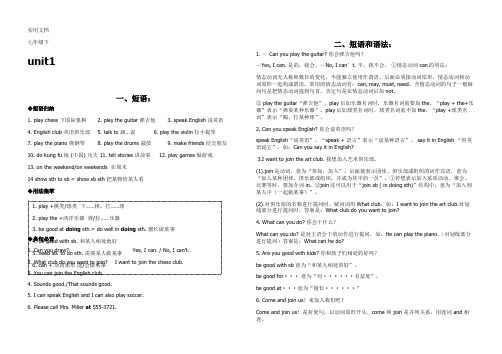
七年级下unit1一、短语:◆短语归纳1. play chess 下国际象棋2. play the guitar 弹吉他3. speak English 说英语4. English club 英语俱乐部5. talk to 跟…说6. play the violin 拉小提琴7. play the piano 弹钢琴8. play the drums 敲鼓9. make friends 结交朋友10. do kung fu 练 (中国) 功夫 11. tell stories 讲故事 12. play games 做游戏13. on the weekend/on weekends 在周末14 show sth to sb = show sb sth 把某物给某人看◆用法集萃◆典句必背1. Can you draw? Yes, I can. / No, I can’t.2. What club do you want to join? I want to join the chess club.3. You can join the English club.4. Sounds good./That sounds good.5. I can speak English and I can also play soccer.6. Please call Mrs. Miller at 555-3721.二、短语和语法:1. — Can you play the guitar? 你会弹吉他吗?—Yes, I can. 是的,我会。
—No, I can’t. 不,我不会。
①情态动词can的用法:情态动词无人称和数目的变化,不能独立使用作谓语,后面必须接动词原形,情态动词和动词原形一起构成谓语。
常用的情态动词有:can, may, must, need。
含情态动词的句子一般疑问句是把情态动词提到句首,否定句是在情态动词后加not。
七年级英语下册语法总结

七年级英语下册语法总结一、七年级下英语语法——词法1、名词A、名词的数我们知道名词可以分为可数名词和不可数名词,而不可数名词它没有复数形式,但可数名词却有单数和复数之分,复数的构成如下:一在后面加s;如:fathers, books, Americans, Germans, apples, bananas二x, sh, ch, s, tch后加es;如:boxes, glasses, dresses, watches, wishes, faxes三1以辅音字母加y结尾的变y为i再加es 如:baby-babies, family-families, duty-duties, comedy-comedies, documentary-documentaries, story-stories2以元音字母加y结尾的直接加s;如:day-days, boy-boys, toy-toys, key-keys, ways四以o结尾加s外来词;如:radios, photos, 但如是辅音加o的加es:如: tomatoes西红柿, potatoes马铃薯五以f或fe结尾的变f为v再加ess;如:knife-knives, wife-wives, half-halves, shelf-shelves, leaf-leaves, yourself-yourselves六单复数相同不变的有:fish, sheep, deer鹿子, Chinese, Japanese七一般只有复数,没有单数的有:people,pants, shorts, shoes, glasses, gloves, clothes, socks八单词形式不变,既可以是单数也可以是复数的有:police警察局,警察, class班,同学, family 家,家庭成员九合成的复数一般只加主要名词,多数为后一个单词;如:action movie-action movies, pen pal-pen pals; 但如果是由man或woman所组成的合成词的复数则同时为复数;如:man doctor-men doctors, woman teacher-women teachers十有的单复数意思不同;如:fish鱼fishes鱼的种类, paper纸papers报纸,卷子,论文, work 工作works作品,工厂, glass玻璃glasses玻璃杯,眼镜, orange桔子水oranges橙子, light 光线lights灯, people人peoples民族, time时间times时代, 次数, chicken 鸡肉chickens 小鸡十一单个字母的复数可以有两种形式直接加s或’s;如:Is I’s, Ks K’s;但如是缩略词则只加s;如:IDs, VCDs, SARs十二特殊形式的有:child-children, man-men, woman-women, foot-feet, mouse-mice, policeman-policemen, Englishman-EnglishmenB名词的格当我们要表示某人的什么东西或人时,我们就要使用所有格形式;构成如下:一单数在后面加’s;如:brother’s, Mike’s, teacher’s二复数以s结尾的直接在s后加’,如果不是以s结尾的与单数一样处理;如:Teachers’ Day 教师节, classmates’; Children’s Day六一节, Women’s Day三八节三由and并列的名词所有时,如果是共同所有同一人或物时,只加最后一个’s,但分别拥有时却分别按单数形式处理;如:Mike and Ben’s room迈克和本的房间共住一间,Mike’s and Ben’s rooms迈克和本的房间各自的房间2、代词项目人称代词物主代词指示代词反身代词人称主格宾格形容词名词性第一人称单数I me my mine myself复数we us our ours ourselves第二人称单数you you your yours yourself复数you you your yours yourselves第三人称单数she her her hers herselfhe him his his himselfit it its its this that itself复数they them their theirs these those themselves3、动词A 第三人称单数当动词是第三人称单数时,动词应该像名词的单数变动词那样加s,如下:一一般在词后加s;如:comes, spells, waits, talks, sees, dances, trains二在x, sh, ch, s, tch后加es;如:watches, washes, wishes, finishes三1以辅音字母加y结尾的变y为i再加es;如:study-studies, hurry-hurries, try-tries2以元音字母加y结尾的直接加s;如:plays, says, stays, enjoys, buys四以o结尾加es;如:does, goes五特殊的有:are-is, have-hasB 现在分词当我们说某人正在做什么事时,动词要使用分词形式,不能用原形,构成如下:一一般在后加ing;如:spell-spelling, sing-singing, see-seeing, train-training, play-playing, hurry-hurrying, watch-watching, go-going, do-doing二以不发音e的结尾的去掉e再加ing;如:dance-dancing, wake-waking, take-taking, practice-practicing, write-writing, have-having三以重读闭音节结尾且一个元音字母+一个辅音字母注意除开字母组合如show –showing, draw-drawing要双写最后的辅音字母再加ing;如:put-putting, run-running, get-getting,let-letting, begin-beginning四以ie结尾的变ie为y再加ing;如:tie-tying系die-dying死lie-lying 位于4、形容词的级我们在对两个或以上的人或物进行对比时,则要使用比较或最高级形式;构成如下:一一般在词后加er或est如果是以e结尾则直接加r或st;如:greater-greatest, shorter –shortest, taller –tallest, longer –longest, nicer- nicest, larger –largest二以重读闭音节结尾且1个元音字母+1个辅音字母字母组合除外,如few-fewer fewest结尾的双写结尾的辅音再加er /est;如:big-bigger biggest, red-redder reddest, hot-hotter hottest三以辅音字母+y结尾的变y为i加er/est;如:happy-happier happiest, sorry-sorrier sorriest, friendly-friendlier friendliestmore friendly most friendly, busy-busier busiest, easy-easier easiest四特殊情况:两好多坏,一少老远good/well - better best many/much - more most bad/ill –worse worstlittle- less least old- older/elder oldest/eldest far- farther/furtherfarthest/furthest5、数词基变序,有规则;一、二、三,自己背;五、八、九、十二;其它后接th;y结尾,变为i, eth跟上去; first, second, third; fifth, eighth, ninth, twelfth; seventh, tenth, thirteenth, hundredth; twenty-twentieth, forty-fortieth, ninety-ninetieth二、七年级英语语法——句式1.陈述句肯定陈述句a This is a book. be动词b He looks very young. 连系动词c I want a sweat like this. 实义动词d I can bring some things to school. 情态动词e There’s a computer on my desk. There be结构否定陈述句a These aren’t their books. b They don’t look nice.c Kate doesn’t go to No. 4 Middle School. d Kate can’t find her doll.e There isn’t a cat here. =There’s no cat here.2. 祈使句肯定祈使句a Please go and ask the man. b Let’s learn Englishc Come in, please.否定祈使句a Don’t be late. b Don’t hurry.3. 疑问句1 一般疑问句a Is Jim a student b Can I help you c Does she like salad d Do they watch TV e Is she reading 肯定回答: a Yes, he is. b Yes, you can. c Yes, she does. d Yes, they do. e Yes, she is.否定回答: a No, he isn’t. b No, you can’t. c No, she doesn’t. d No, they don’t. e No, she isn’t.2 选择疑问句Is the table big or small 回答It’s big./ It’s small.3 特殊疑问句①问年龄How old is Lucy She is twelve.②问种类What kind of movies do you like I like action movies and comedies.③问身体状况How is your uncle He is well/fine.④问方式How do/can you spell it L-double O-K.How do we contact you My e-mail address is cindyjones163.⑤问原因Why do you want to join the club⑥问时间What’s the time =What time is it It’s a quarter to ten a.m..What time do you usually get up, Rick At five o’clock.When do you want to go Let’s go at 7:00.⑦问地方Where’s my backpack It’s under the table.⑧问颜色What color are they They are light blue.What’s your favourite color It’s black.⑨问人物Who’s that It’s my sister.Who is the boy in blue My brother.Who isn’t at school Peter and Emma.Who are Lisa and Tim talking to⑩问东西What’s this/that in English It’s a pencil case.What else can you see in the picture I can see some broccoli, strawberries and hamburgers.11问姓名What’s your aunt’s name Her name is Helen./She’s Helen.What’s your first name My first name’s Ben.What’s your family name My family name’s Smith.12 问哪一个Which do you like I like one in the box.13 问字母What letter is it It’s big D/small f.14 问价格How much are these pants They’re 15 dollars.15 问电话号码What’s your phone number It’s 576-8349.16 问谓语动作What’s he doing He’s watching TV.17 问职业身份What do you do I’m a teacher.What’s your father He’s a doctor.三、七年级英语语法——时态1、一般现在时表示普遍、经常性的或长期性的动作时使用一般现在时,它有:Be 动词:She’s a worker. Is she a worker She isn’t a worker.情态动词:I can play the piano. Can you play the piano I can’t play the piano.行为动词:They want to eat some tomatoes. Do they want to eat any tomatoes They don’t want to eat any tomatoes.Gina has a nice watch. Does Gina have a nice watch Gina doesn’t have a watch.2、现在进行时表示动词在此时正在发生或进行就使用进行时态,结构为sb be v-ing sth + 其它.I’m playing baseball. Are you playing baseball I’m not playing baseball.Nancy is writing a letter. Is Nancy writing a letter Nancy isn’t writing a letter.They’re listening to the pop music. Are they listening the pop music They aren’t listening to the pop music.。
人教版七年级英语下册重点短语总汇,语法总结

人教版七年级英语下册重点短语总汇,语法总结人教版七年级英语下册重点短语总汇,语法总结各单元知识概要Unit 1 here’s ur pen pal fr?一、词组be fr= e fr 自pen pal=pen friend 笔友lie and dislie 好恶;爱憎live in…在居住spea English 讲英语pla sprts 做体育运动a little Frenh 一些法语g t the vies 去看电影an atin vie 一部动作片n eeends 在周末Exuse e 对不起,打扰get t 到达、抵达beginning f 在开始的时候at the end f 在结束的时候arrive at /二、句型(1)、here主+be+主语+fr?主语+be+fr+地点(2)、here d/des+主语+live?主语+live/lives in…(3)、hat language d/des +主语+spea? 主语+spea/speas…(4)、主语+lie/lies+ding…三、日常交际用语1-here is ur pen pal fr?-He’s fr hina2-here des she live?--She lives in T3-Des she spea English?-es,she des/N,she dsen’t4-Is that ur ne pen pal?-es,he is /N,he isn’t-hat language des she spea?-She speas EnglishUnit 2 here’s the pst ffie一、词组pst ffie 邮局pa phne 投币式公用电话next t 在隔壁arss fr 在对面in frnt f 在前面beteen…and… 在和之间n a street 在街上in the neighbrhd 在附近n the right/left 在右边/在左边n ne’s right/left 在某人的右边/左边turn right/left 向右/左转tae a al 散步have fun 玩得开心the a t …去的路tae a taxi 打的/乘出租车g dn(alng)…沿着走g thrugh穿过have a gd trip 旅途愉快二、句型(1)、Is there a ban near here?es,there is It’s n entre StreetN,there isn’t(2)、here’s the superaret?It’s next t the librar(3)、Bridge Street is a gd plae t have fun(4)、I hpe u have a gd trip()、If u are hungr,u an bu fd in the restaurant(6)、Tal a al thugh the par(7)、en后接名词或动词-ing形式D u en(=lie) ur r?D u en(=lie) living in the it?三、日常交际用语(1)、Is there a …?句型Eg:-Exuse eIs there a htel in the neighbrhd-es, there is Nthere isn’t(2)、here is …?句型Eg:-here is the par,please?-It’s behind the ban(肯定回答)-I’srr I dn’t n (否定回答)(3)、hih is the a t +地点? 句型例如:- hih is the a t the librar(4)、H an I get t +地点?句型例如:-H an I get t the restaurant?()、an u tell e the a t +地点?句型例- an u tell e the a t the pst ffie?(6)、Let e tell u the a t huse(7)、ust g straight and turn leftUnit 3 h d u lie alas?一、词组ant t d sth 想要做某事ant sb t d sth 想要某做某事ant sth 想要某物Let sb d sth 让某人做某事ind f 有几分\种类a ind f 一种……ears ld …年龄如:ten ears ld 十岁lie t d sth 喜欢做某事lie ding sthpla ith … 与一起玩be quiet 安静during the da 在白天at night 在夜间have a l at 看ne…the ther 一个另一个二、句型(1)、-h d u lie pandas?-Beause the’re ver ure(2)、-h dse he lie alas?-Beause the are ind f interesting(3)、-here are lins fr?-Lins are fr Suth Afria(4)、-hat anials d u lie?-I lie elephants三、日常交际用语(1)、-Let’s see the lins(2)-h d u ant t see the lins?-Bease the are ver ute(3)-D u lie giraffes?es,I d/ N,I dn’t(4)-hat ther anial d u lie?_I lie dgstther+ 名词的复数表示没有特定的数量范围the ther+名词的复数表示有特定的数量范围()-h are u ling at e? -Beause u are ver ute(6)-Let us pla gaes –Great!Let e seeUnit 4 I ant t be an atr一、词组ant t be+职业想要成为。
最全初一(七年级)英语下册语法知识归纳总结
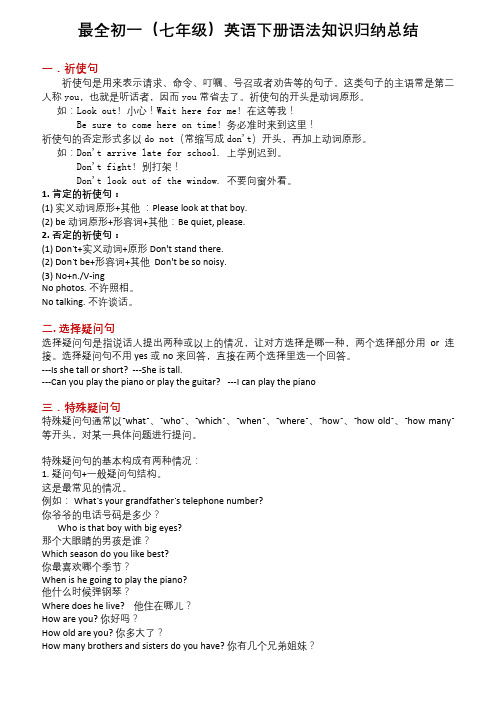
最全初一(七年级)英语下册语法知识归纳总结一.祈使句祈使句是用来表示请求、命令、叮嘱、号召或者劝告等的句子,这类句子的主语常是第二人称you,也就是听话者,因而you常省去了。
祈使句的开头是动词原形。
如:Look out! 小心!Wait here for me! 在这等我!Be sure to come here on time! 务必准时来到这里!祈使句的否定形式多以do not(常缩写成don't)开头,再加上动词原形。
如:Don't arrive late for school. 上学别迟到。
Don't fight! 别打架!Don't look out of the window. 不要向窗外看。
1. 肯定的祈使句:(1) 实义动词原形+其他:Please look at that boy.(2) be动词原形+形容词+其他:Be quiet, please.2. 否定的祈使句:(1) Don’t+实义动词+原形 Don't stand there.(2) Don’t be+形容词+其他 Don't be so noisy.(3) No+n./V-ingNo photos. 不许照相。
No talking. 不许谈话。
二. 选择疑问句选择疑问句是指说话人提出两种或以上的情况,让对方选择是哪一种,两个选择部分用or连接。
选择疑问句不用yes或no来回答,直接在两个选择里选一个回答。
---Is she tall or short? ---She is tall.---Can you play the piano or play the guitar? ---I can play the piano三.特殊疑问句特殊疑问句通常以“what”、“who”、“which”、“when”、“where”、“how”、“how old”、“how many”等开头,对某一具体问题进行提问。
精编七年级英语下册全部语法知识点总结
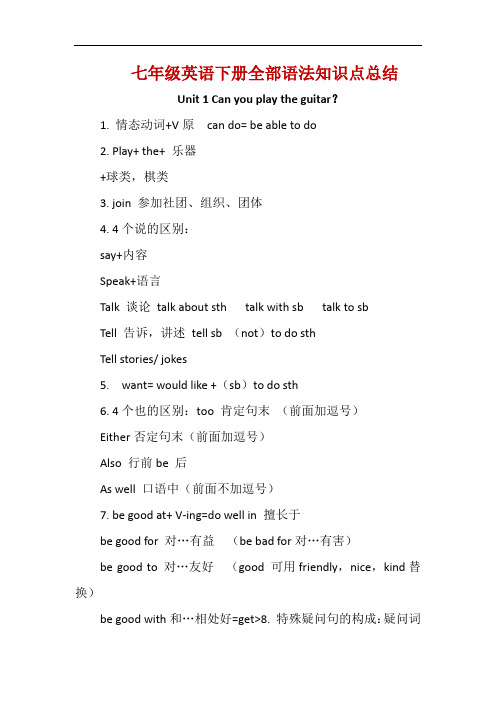
七年级英语下册全部语法知识点总结Unit 1 Can you play the guitar?1. 情态动词+V原can do= be able to do2. Play+ the+ 乐器+球类,棋类3. join 参加社团、组织、团体4. 4个说的区别:say+内容Speak+语言Talk 谈论talk about sth talk with sb talk to sbTell 告诉,讲述tell sb (not)to do sthTell stories/ jokes5. want= would like +(sb)to do sth6. 4个也的区别:too 肯定句末(前面加逗号)Either否定句末(前面加逗号)Also 行前be 后As well 口语中(前面不加逗号)7. be good at+ V-ing=do well in 擅长于be good for 对…有益(be bad for对…有害)be good to 对…友好(good 可用friendly,nice,kind替换)be good with和…相处好=get>8. 特殊疑问句的构成:疑问词+一般疑问句9. How/ what about+V-ing …怎么样?(表建议)10. 感官动词(look, sound, taste, smell, feel)+adj/ like11. 选择疑问句:回答不能直接用Yes或者No,要从中选择一个回答12. students wanted for school show(wanted表示招募,含有被动意义)13. show sth to sb=show sb sthgive sth to sb=give sb sth14. help sb (to)do sthHelp sb with sthWith sb’s help= with the help of sbHelp>15. be busy doing sth/ be busy with sth16. need to do sth17. be free= have time18. have friends= make friends19. call sb at +电话号码20.on the weekend= on weekends21. English-speaking students 说英语的学生(带有连词符,有形容词性质)22. do kung fu表演功夫Unit 2 What time do you go to school?1. 问时间用what time或者whenAt+钟点at 7 o’clockat noon/ at night(during/ in the day)On+ 具体某天、星期、特指的一天on April 1st on Sunday on a cold winter morning In +年、月、上午、下午、晚上2. 时间读法:顺读法逆读法:分钟≤30用pastfive past eight(8:05)half past eight(8:30)分钟>30用to a quarter to ten(9:45)整点用…o’clock 7 o’clock(7:00)3. 3个穿的区别:wear 表状态,接服装、手套、眼镜、香水等Put>Dress 表动作,接sb/>4. from…to…5. be/ arrive late for6. 频度副词(行前be后)Always usually often sometimesseldom hardly never7. 一段时间前面要用介词forfor half an hour for five minutes8. eat/ have…for breakfast/ lunch/ dinner/ supper9. either…or10. a lot of=lots of11. it is +adj+for sb +to do sth (adj修饰to do sth)It is important for me to learn English.it is +adj+of sb +to do sth (adj修饰sb)It is kind/ friendly/ nice of you to help me.12. 感叹句:How+adj+主谓!How+adj+a/an +n单+主谓!What+ a/an +adj+ n单+主谓!What+ adj+ n复/ 不可数+主谓!Unit 3 How do you get to school?1. 疑问词How 如何(方式)how long 多长(时间)答语常用“(For/ about +)时间段”how far多远(距离)答语常用“(It’s +)数词+miles/ meters/ kilometers”how often多久一次(频率)答语常用“Always/ often/ every day/…”或“次数+时间”等表频率的状语How soon多快,多久以后,常用在将来时中。
七下英语语法知识点归纳总结

七下英语语法知识点归纳总结以下是七下英语的部分语法知识点:1. 现在进行时定义:表示正在进行的动作或存在的状态。
结构:be (am/is/are) + 动词的现在分词。
动词现在分词形式:动词+ing,例如:playing, singing, 写作:writing。
用法:描述真实情境中的动作,例如“他正在看书”。
2. 动词不定式定义:动词不定式是非谓语动词的一种形式,表示不定或未来的动作。
结构:to + 动词原形,例如:to play, to go。
用法:作为目的状语、作为后置定语等。
3. 形容词的比较级和最高级定义:形容词的比较级表示“更……”,最高级表示“最……”。
结构:比较级:形容词+er,最高级:形容词+est。
用法:描述物品的大小、重量、长度等属性的比较,例如“这个苹果比那个大”。
4. 情态动词定义:情态动词是一种表示可能性、必要性的助动词。
结构:can, could, may, might, must等。
用法:表示可能性,例如“他可能在这儿”;表示必要性,例如“你必须快点儿”。
5. 一般将来时定义:表示未来的动作或状态。
结构:will + 动词原形,例如:will go, will be。
用法:描述未来的计划、安排等,例如“明天我将要去公园”。
6. 一般现在时定义:表示现在的动作或状态。
结构:动词原形,第三人称单数形式为动词+s/es。
用法:描述日常习惯、事实等,例如“我每天早上跑步”。
7. 现在完成时定义:表示过去的动作对现在的影响或过去的动作持续到现在。
结构:have/has + 过去分词。
用法:描述已经完成的动作或状态,例如“我已经完成了作业”。
8. 时间介词和连词表示时间的介词:at, on, in;before, after;since等。
表示时间的连词:when, while等。
用法:描述时间关系,例如“我在上学的时候去了北京”。
9. 宾语从句和定语从句宾语从句:放在动词或介词后面的句子,充当宾语。
七年级下册英语所有必考单词、词组语法总结

begood for···对······有益处begood at···擅长······
helpsbwithsth / doing sth帮助某人干某事help kidswithswimming帮助孩子们游泳
doChinese kungfu表演中国பைடு நூலகம்夫be in参加,加入
play the drums敲鼓play chess下象棋speakEnglish说英语
speak a little English说一点英语say it inEnglish用英语说它
join the artclub加入艺术俱乐部join thebasketballclub加入篮球俱乐部
join theswimming club加入游泳俱乐部what club什么俱乐部
Shedoesn’tlike singing,andshedoesn’t like dancing,either.她不喜欢唱歌,也不喜欢跳舞。
【辨析】
either,too, also
三者都可作“也”讲,但用法稍有不同。
either
用于否定句末尾。
Ididn’tgototheparty,either.
15.in themorning/afternoon/ evening在上午/下午/晚上
16.takeawalk散步ﻩ17.lotsof=a lotof许多,大量ﻩﻩ18.radio station广播电台
19.atnight在晚上ﻩ20.belatefor=arrive latefor迟到
◆用法集萃
◆短语归纳
1.get toschool到达学校ﻩ2.take the subway乘地铁ﻩﻩ3.rideabike骑自行车
七年级下册英语知识点总结归纳
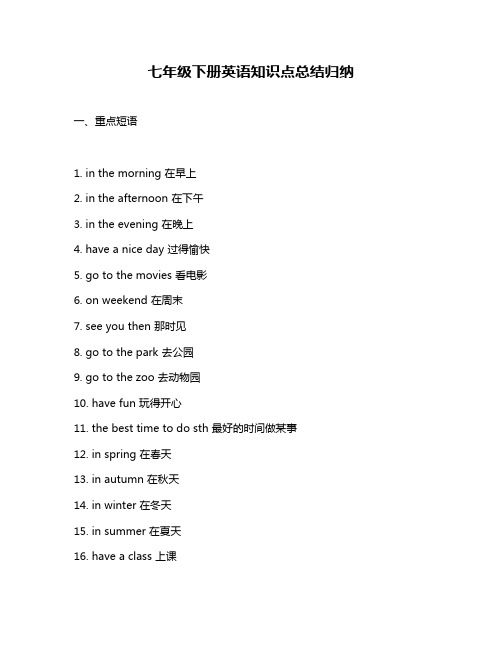
七年级下册英语知识点总结归纳一、重点短语1. in the morning 在早上2. in the afternoon 在下午3. in the evening 在晚上4. have a nice day 过得愉快5. go to the movies 看电影6. on weekend 在周末7. see you then 那时见8. go to the park 去公园9. go to the zoo 去动物园10. have fun 玩得开心11. the best time to do sth 最好的时间做某事12. in spring 在春天13. in autumn 在秋天14. in winter 在冬天15. in summer 在夏天16. have a class 上课17. have a swim 游泳18. have a picnic 野餐19. have a nap 小睡一会20. have fun playing with children 与孩子们一起玩耍21. the next day 第二天22. the day after tomorrow 后天23. the day before yesterday 前天24. the week after next 下下周25. the week before last 上上周26. three days ago 三天前27. two months ago 两个月前28. next Monday 下周一29. last Wednesday 上周三30. three weeks ago 三周前31. five years ago 五年前32. since 自从,因为。
表示一种因果关系,常跟完成时连用。
例如:since you were ill, I have kept you at home。
因为你病了,我一直让你呆在家里。
七年级下册英语语法大总结
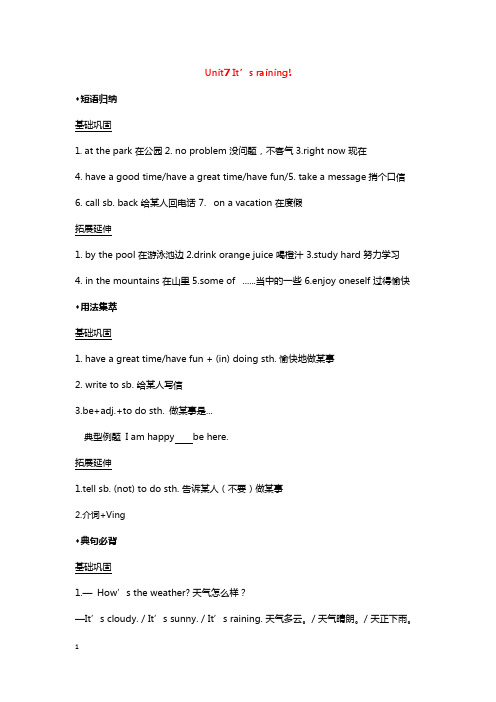
Unit7 It’s raining!◆短语归纳基础巩固1.at the park 在公园2. no problem 没问题,不客气3.right now 现在4.have a good time/have a great time/have fun/5. take a message捎个口信6. call sb. back 给某人回电话7. on a vacation 在度假拓展延伸1.by the pool 在游泳池边2.drink orange juice 喝橙汁3.study hard 努力学习4. in the mountains 在山里5.some of ......当中的一些6.enjoy oneself 过得愉快◆用法集萃基础巩固1.have a great time/have fun + (in) doing sth. 愉快地做某事2. write to sb. 给某人写信3.be+adj.+to do sth. 做某事是...典型例题I am happy be here.拓展延伸1.tell sb. (not) to do sth. 告诉某人(不要)做某事2.介词+Ving◆典句必背基础巩固1.—How’s the weather? 天气怎么样?—It’s cloudy. / It’s sunny. / It’s raining. 天气多云。
/ 天气晴朗。
/ 天正下雨。
2. How’s it going? 情况怎么样?Great! /Not bad./Terrible! 好极了!/ 不错。
/糟糕!3. Can I take a message for him? 我给他捎个口信好吗?4. I’m having a great time visiting my aunt in Canada.我正在加拿大愉快地拜访我的姑姑。
拓展延伸1. My family and I are on a vacation in the mountains.我和我的家人正在山里度假。
人教版七年级英语下册重点短语及语法梳理

Unit1 Can you play the guitar?【重点短语】1. play the guitar 弹吉他2. play chess 下棋3. speak English 说英语3. what to do sth 想做某事4. join the music club 参加音乐俱乐部5. match…..with 与……匹配6. the swimming club 游泳俱乐部7. what club 什么俱乐部8. a sports club 一个体育俱乐部10. be good at telling stories 擅长讲故事11. the story telling club 讲故事俱乐部12. like to do/doing sth 喜欢做某事13. let’s join 让我们参加......14. sound good 听起来不错15. students wanted for School Show 学校表演招聘学生16. talk to/with sb 跟某人谈话17. after school 放学后18. do kung fu表演功夫练功夫19. show sb. sth.=show sth. to sb. 把某物展示给某人20. play games with people 和人们做游戏21.be in the school music club 在学校音乐俱乐部22. help for old people 对老人的援助23. be good with… 和某人相处得好,特长和..打交道24. be free / be busy 空闲的/忙的25. in July 在六月份26. tell sb. stories 给某人讲故事27. make frie nds with… 和某人交朋友28. call sb. at …… 给某人打……29. on the weekend 在周末30. help sb.〔to〕do sth. 援助某人做某事31. help sb. with sth. 在某方面援助某人32. English-speaking students 说英语的学生33. It is+adj +〔for sb〕to sth. 做某事〔对于某人来说〕是…..34. play the piano 弹钢琴35. play the violin 拉小提琴36. the Students’ Sports Center学生运动中心37. need help to teach music 需要援助来做某事38. need sb. to do sth 需要某人做某事39. teach sb. to do sth 教某人做某事40. be in our school music festival 参加我们学校的音乐节Unit2 What time do you go to school?【重点短语】1. go to school 去上学2. get up 起床3. get dressed 穿衣服4. brush teeth 刷牙5. eat breakfast 吃早饭6. take a shower 洗澡7. what time 什么时间8. at six forty 在六点四十9. an interesting job 一个有趣的工作10. at the radio station 在播送电视台11. usually /always/ often/ sometimes/ never 经常/总是/经常/有时/从不12. your radio show 你的播送节目13. from …..to 从….到…..14. at night 在夜晚15. a funny time 一个有趣的时间16. take exercise 锻炼17. be late for….. 因… 迟到18. at about ten twenty 在大约十点二十19. on weekends 在周末20. on school days 在上学日21. half past six 六点半22. a quarter past three 三点过一刻〔3:15〕23. a quarter to ten 十点差一刻〔9:45〕24. do 〔one’s〕homework 做〔某人的〕家庭作业25. take a walk 散步26. go to bed 睡觉27. eat quickly 吃得快28. have much time 有许多时间29. half an hour 半个小时30. get home 到达家31. either…..or 或者…….或者...... 32. eat a good breakfast 好好吃顿早餐33. lots of = a lot of 许多34. be good for….. 对…….有益35. taste good 尝起来好36. do her homework 做她的家庭作业37. have a healthy life 有一个健康的生活方式38. have dinner 吃晚饭Unit3 How do you get to school?【重点短语】1. get to school 到达学校2. take the train 乘火车3. take the subway 乘地铁4. ride a bike 骑自行车5. how do you get to school 怎么到达学校6. one hundred and five 1057. how far 多远8. how long 多长时间9. it takes sb some time to do sth 它花费某人多长时间做某事10. ride the bike to school 骑自行车到学校11. walk to , drive to ,fly to…步行去…;开车去…;坐飞机去….12. every day 每天13. I’m not sure 我不敢确信14. about= around 大约15. 10 kilometers 十公里16. good exercise 好的锻炼17. drive his car to work 开车去上班18. in his father’s car 坐父亲的车19. need about 10 minutes to get to school 需要十分钟的时间到达学校20. what do you think of=how do you like你觉得怎么样21. cross the river 过河22. It is easy to get to school. 到达学校很简单。
(完整版)人教版英语七年级下册第四单元短语语法知识点总结及练习

(完整版)人教版英语七年级下册第四单元短语语法知识点总结及练习Unit 4Don’t eat in class【短语归纳】1.on time 准时,按时2. listen to …听……3. in class 在课上4. be late for 做……迟到5. have to 不得不6. be quiet安静7. go out外出8. do the dishes 清洗餐具9. make breakfast 做早饭10. make (one’s) bed 铺床11. be noisy 吵闹12. keep one’s hair short 留短发13. play with sb. 和某人一起玩14. play the piano 弹钢琴15. have fun 玩得高兴16. make rules 制订规则【用法集萃】1.Don’t + 动词原形+其他,不要做某事。
2.help sb. (to) do sth. 帮助某人做某事3.too many + 可数名词复数太多的……4.practice doing sth. 练习做某事5. be strict with sb. 对某人要求严格6. be strict in sth. 对某事要要求严格7. leave sth sp. 把某物忘在某地8. keep + 宾语+形容词使……保持某种状态9. learn to do sth. 学会做某事10. have to do sth. 不得不做某事┃语法探究┃┃.祈使句定义:用于表达命令、请求、劝告、警告、禁止等的句子叫__________句。
时态:使用______________时态。
结构:动词原形+其他成分+please. 否定祈使句在动词原形前面加__________ 。
如:Be quiet in the classroom, please.在教室里请保持安静。
Don't fight. 不要打架┃.情态动词have to 和must1.情态动词have to和must都表示“__________”的意思。
七年级下册英语语法点总结(新目标)

七年级下册英语语法点总结Unit 1 Where’s your pen pal from?一.短语:1 .be from = come from 来自于----2.live in 居住在---3.on weekends 在周末4 .write to sb = write a letter to sb 给某人写信;写信给某人5 .in the world 在世界上in China 在中国6.pen pal 笔友14 years old 14岁favorite subject 最喜欢的科目7.the United States 美国the United Kingdom 英国New York 纽约8.speak English 讲英语like and dislike 爱憎9.go to the movies 去看电影play sports 做运动二.重点句式:1 Where’s your pen pal from? = Where does your pen pal from/2 Where does he live?3 What language(s) does he speak?4 I want a pen pal in China.5 I can speak English and a little French.6 Please write and tell me about yourself.7 Can you write to me soon?8 I like going to the movies with my friends and playing sports.三.本单元的国家,人民、语言对应。
1 Canada---- Canadian---- English / French2 France------ French------French3 Japan------Japanese----Japanese4 Australia----Australian----- English5 the United States------ American---- English6 the United Kingdom---British----- EnghishUnit 2 Where’s the post offic e?一.Asking ways: (问路)1.Where is (the nearest) ……?(最近的)……在哪里?2.Can you tell me the way to ……?你能告诉我去……的路吗?3.How can I get to ……?我怎样到达……呢?4.Is there …… near here / in the neighborhood? 附近有……吗?5.Which is the way to ……?哪条是去……的路?二.Showing the ways: (指路)1. Go straight down / along this street. 沿着这条街一直走。
七年级下册英语知识点总结归纳人教版
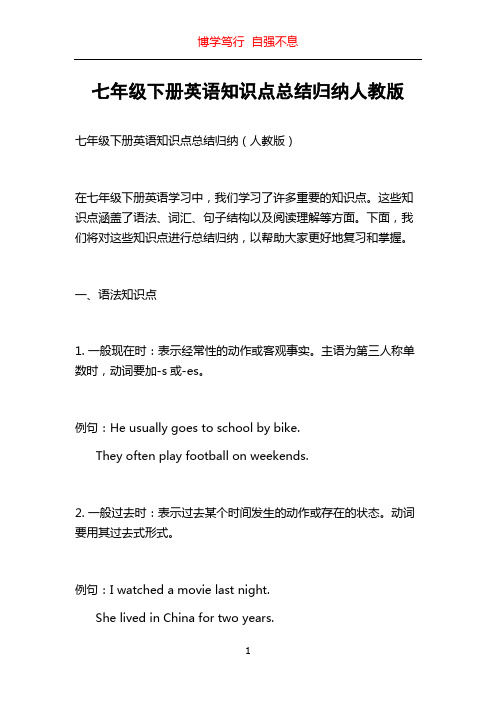
七年级下册英语知识点总结归纳人教版七年级下册英语知识点总结归纳(人教版)在七年级下册英语学习中,我们学习了许多重要的知识点。
这些知识点涵盖了语法、词汇、句子结构以及阅读理解等方面。
下面,我们将对这些知识点进行总结归纳,以帮助大家更好地复习和掌握。
一、语法知识点1. 一般现在时:表示经常性的动作或客观事实。
主语为第三人称单数时,动词要加-s或-es。
例句:He usually goes to school by bike.They often play football on weekends.2. 一般过去时:表示过去某个时间发生的动作或存在的状态。
动词要用其过去式形式。
例句:I watched a movie last night.She lived in China for two years.3. 现在进行时:表示说话时正在进行的动作。
构成:主语+be动词(am, is, are)+动词-ing。
例句:They are playing basketball in the park.We are learning English now.4. 一般将来时:表示将来要发生的动作或存在的状态。
构成:主语+will+动词原形。
例句:I will visit my grandparents next weekend.She will be a doctor in the future.5. 情态动词:can, may, must等,表示能力、许可、必须等。
例句:You can go to the park with us.Students must wear school uniforms.6. 宾语从句:用来充当主句中动词的宾语的从句。
例句:I think that he is a good student.She knows where the nearest supermarket is.二、词汇知识点1. 动词短语:由动词与副词/介词组成的短语。
仁爱英语七年级下短语知识点总结
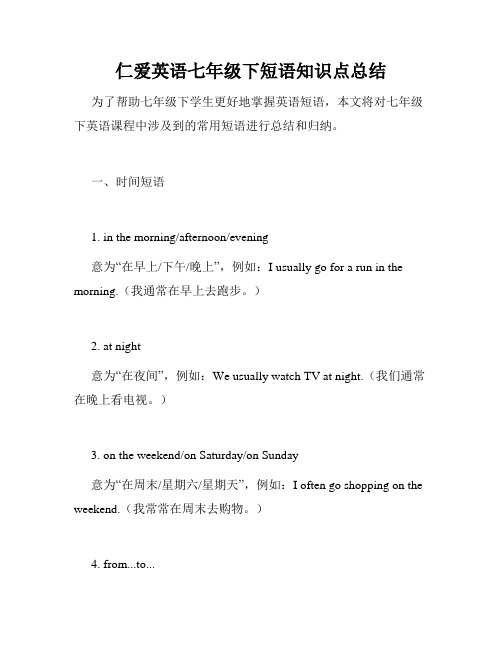
仁爱英语七年级下短语知识点总结为了帮助七年级下学生更好地掌握英语短语,本文将对七年级下英语课程中涉及到的常用短语进行总结和归纳。
一、时间短语1. in the morning/afternoon/evening意为“在早上/下午/晚上”,例如:I usually go for a run in the morning.(我通常在早上去跑步。
)2. at night意为“在夜间”,例如:We usually watch TV at night.(我们通常在晚上看电视。
)3. on the weekend/on Saturday/on Sunday意为“在周末/星期六/星期天”,例如:I often go shopping on the weekend.(我常常在周末去购物。
)4. from...to...意为“从......到......”,例如:I study from Monday to Friday.(我从周一到周五学习。
)二、地点短语1. at home/at school/at the park意为“在家/在学校/在公园”,例如:I like to play with my dog at home.(我在家里喜欢和我的狗玩。
)2. in the city/in the country/in the mountains意为“在城市里/在农村里/在山里”,例如:We live in the city.(我们住在城市里。
)3. on the street/on the road/on the sidewalk意为“在街上/在路上/在人行道上”,例如:I like to walk on the sidewalk.(我喜欢在人行道上散步。
)4. by the seaside/by the lake/by the river意为“在海边/在湖边/在河边”,例如:We had a picnic by the river.(我们在河边野餐。
(完整版)七年级下册英语语法
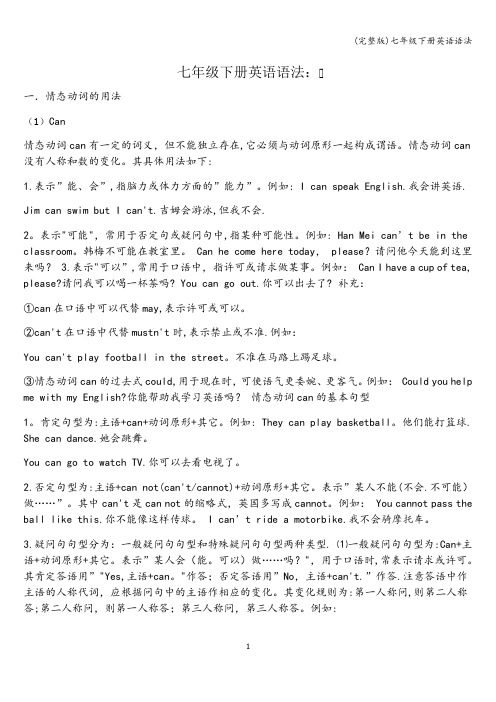
七年级下册英语语法:一.情态动词的用法(1)Can情态动词can有一定的词义,但不能独立存在,它必须与动词原形一起构成谓语。
情态动词can 没有人称和数的变化。
其具体用法如下:1.表示”能、会”,指脑力或体力方面的”能力”。
例如: I can speak English.我会讲英语.Jim can swim but I can't.吉姆会游泳,但我不会.2。
表示"可能",常用于否定句或疑问句中,指某种可能性。
例如: Han Mei can’t be in the classroom。
韩梅不可能在教室里。
Can he come here today, please?请问他今天能到这里来吗? 3.表示"可以”,常用于口语中,指许可或请求做某事。
例如: Can I have a cup of tea, please?请问我可以喝一杯茶吗? You can go out.你可以出去了? 补充:①can在口语中可以代替may,表示许可或可以。
②can't在口语中代替mustn't时,表示禁止或不准.例如:You can't play football in the street。
不准在马路上踢足球。
③情态动词can的过去式could,用于现在时,可使语气更委婉、更客气。
例如: Could you help me with my English?你能帮助我学习英语吗? 情态动词can的基本句型1。
肯定句型为:主语+can+动词原形+其它。
例如: They can play basketball。
他们能打篮球. She can dance.她会跳舞。
You can go to watch TV.你可以去看电视了。
2.否定句型为:主语+can not(can't/cannot)+动词原形+其它。
表示”某人不能(不会.不可能)做……”。
其中can't是can not的缩略式,英国多写成cannot。
七年级英语下册重点短语和语法归纳总结
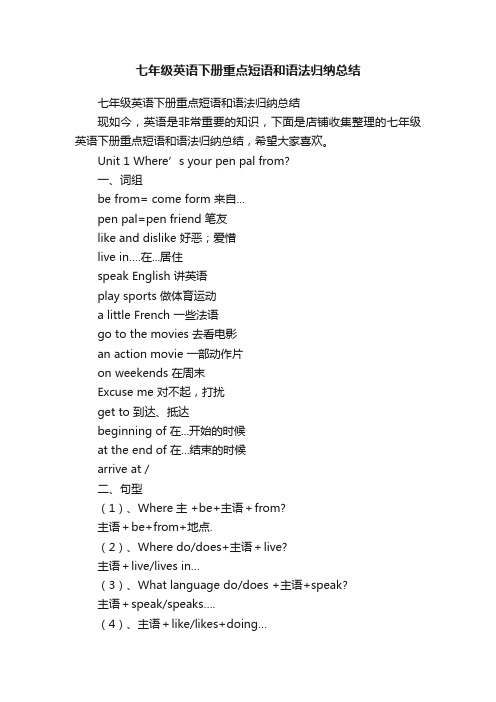
七年级英语下册重点短语和语法归纳总结七年级英语下册重点短语和语法归纳总结现如今,英语是非常重要的知识,下面是店铺收集整理的七年级英语下册重点短语和语法归纳总结,希望大家喜欢。
Unit 1 Where’s your pen pal from?一、词组be from= come form 来自...pen pal=pen friend 笔友like and dislike 好恶;爱憎live in….在...居住speak English 讲英语play sports 做体育运动a little French 一些法语go to the movies 去看电影an action movie 一部动作片on weekends 在周末Excuse me 对不起,打扰get to 到达、抵达beginning of 在...开始的时候at the end of 在...结束的时候arrive at /二、句型(1)、Where主 +be+主语+from?主语+be+from+地点.(2)、Where do/does+主语+live?主语+live/lives in…(3)、What language do/does +主语+speak?主语+speak/speaks….(4)、主语+like/likes+doing…三、日常交际用语1-Where is your pen pal from?-He’s from China.2-Where does she live?--She lives in Tokyo.3-Does she speak English?-Yes,she does/No,she dosen’t.4-Is that your new pen pal?-Yes,he is /No,he isn’t.5-What language does she speak? -She speaks English.Unit 2 Where’s the post office一、词组post office 邮局pay phone 投币式公用电话next to 在...隔壁across from 在...对面in front of 在...前面between…and… 在...和...之间on a street 在街上in the neighborhood 在附近on the right/left 在右边/在左边on one’s right/left 在某人的右边/左边turn right/left 向右/左转take a walk 散步have fun 玩得开心the way to …去...的路take a taxi 打的/乘出租车go down(along)…沿着...走go through...穿过...have a good trip 旅途愉快二、句型(1)、Is there a bank near here?Yes,there is .It’s on Centre Street.No,there isn’t.(2)、Where’s the sumpermarket?It’s next to the library.(3)、Bridge Street is a good place to have fun.(4)、I hope you have a good trip.(5)、If you are hungry,you can buy food in the restaurant.(6)、Talk a walk though the park..(7)、enjoy后接名词或动词-ing形式.Do you enoy(=like) your work?Do you enjoy(=like) living in the city?三、日常交际用语(1)、Is there a ….?句型Eg:-Excuse me.Is there a hotel in the neighborhood.-Yes, there is. No.there isn’t(2)、Where is …?句型Eg:-Where is the park,please?-It’s behind the bank.(肯定回答)-I’m sorry I don’t know. (否定回答)(3)、Which is the way to +地点? 句型.例如:- Which is the way to the library.(4)、How can I get to +地点?句型.例如:-How can I get to the restaurant?(5)、Can you tell me the way to +地点?句型.例- Can you tell me the way to the post office?(6)、Let me tell you the way to my house.(7)、Just go straight and turn left.Unit 3 Why do you like koalas?一、词组want to do sth .想要做某事want sb to do sth 想要某做某事want sth 想要某物Let sb do sth 让某人做某事kind of 有几分种类a kind of 一种……years old …年龄如:ten years old 十岁like to do sth 喜欢做某事like doing sthplay with … 与...一起玩be quiet 安静during the day 在白天at night 在夜间have a look at.. 看...one…the other 一个...另一个...二、句型(1)、-why do you like pandas?-Because they’re very cure.(2)、-Why dose he like koalas?-Because they are kind of interesting.(3)、-Where are lions from?-Lions are from South Africa.(4)、-What animals do you like?-I like elephants.三、日常交际用语(1)、-Let’s see the lions.(2)-Why do you want to see the lions? -Becase they are very cute.(3)-Do you like giraffes?Yes,I do./ No,I don’t(4)-What other animal do you like?_I like dogs.tooother+ 名词的复数.表示没有特定的数量范围the other+名词的复数表示有特定的数量范围.(5)-Why are you looking at me?-Because you are very cute.(6)-Let us play games. CGreat!Let me see.Unit 4 I want to be an actor.一、词组want to be+职业想要成为...shop assistant 店员bank clerk 银行职员work with 与...一起工作work hard 努力工作work for 为...而工作work as 作为..而工作get.. from…从...获得...give sth.to.sb /give.sb.sth 把某物给某人正确的表示:give it/them to sb.错误的表示:give sb.it/themin the day 在白天at night 在夜间talk to /with 与…讲话go out to dinners 外出吃饭in a hospital 在医院newspaper reporter 报社记者movie actor 电影演员二、句型(1)-What do/does+某人+do?例:-What do you do?-I’m a student.-What dose he do? He’s a teacher.(2)-What do/does+某人+want to be?例:What do you want to be?-I want to be a teacher. -What does she want to be ?She want to be a nuser.(3)-Where does your sister work?-She works in a hospital.(4)-Does he work in the hospiatYes.he does/No,he doesn’t(5)-Does she work late?-Yes,she does/No.she doesn’t(6)-英语中询问职业的几种表达方式:What do/does …do?What is…? What is your father?What’s one’s job?例:What’s your father’s job? Unit 5 I’m watching TV.一、词组do homework 做家庭作业watch TV 看电视eat dinner 吃饭;就餐clean the room 打扫房间read newspaper/a book 看报纸/看书go to the movies 看电影write a letter 写信wait for 等待;等候talk about 谈论·······play basketball/soccer/ 打篮球/踢足球take photos 拍照TV show 电视节目Some of······中的一些a photo of my family 我的家庭照at school 在学校be with 和·····一起in the tree 在树上二、句型(1)-What+be+主语+doing? ….正在做什么?-主语+be+doing·。
七年级下册英语语法总结
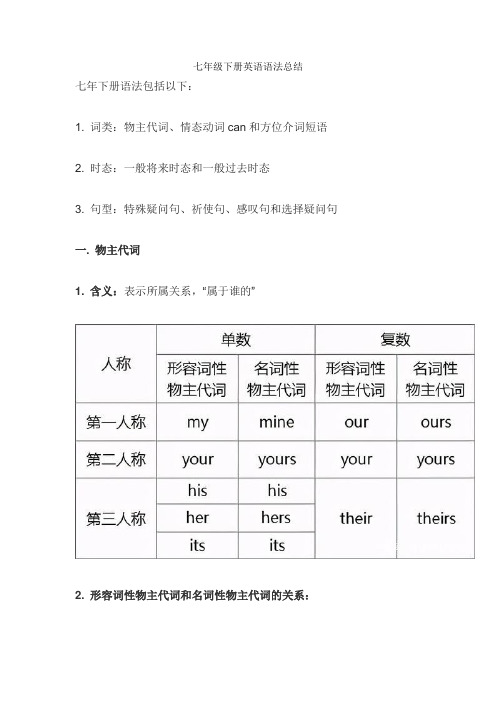
七年级下册英语语法总结七年下册语法包括以下:1. 词类:物主代词、情态动词can和方位介词短语2. 时态:一般将来时态和一般过去时态3. 句型:特殊疑问句、祈使句、感叹句和选择疑问句一. 物主代词1. 含义:表示所属关系,“属于谁的”2. 形容词性物主代词和名词性物主代词的关系:(1)形容词性物主代词:其后必须接名词。
my father, your teacher ...(2)名词性物主代词:相当于与之相对应的形容词性物主代词+名词。
If you can't find your hat, take mine (my hat).二. 情态动词can1. 含义:表达人或物的能力,“能,会”2. 特点:情态动词can没有人称和数的变化,之后要加动词原形。
3. 否定形式:cannot (正式用法)=can’t (口语)4. 句型结构:肯定句:主语+can+动词原形+其他.She/They can swim well.否定句:主语+can't/cannot+动词原形+其他.She/They cannot swim well.一般疑问句:情态动词can+主语+动词原形+其他?Can she/they swim well?一般疑问句答语:Yes,+主语+情态动词can.或No,+主语+can't/cannot.Yes, she/they can.No, she/they can’t.特殊疑问句:特殊疑问词+情态动词can+主语+动词原形+其他? Why can she/they swim well?当特殊疑问词是句子的主语时:特殊疑问词+can+动词原形? Who can swim well?三. 介词1. between ... and ... 在两者之间Lingling sits between Tony and Daming.玲玲坐在托尼和大明之间。
2. among 在三者或三者以上之间Miss Li is among lots of students.李老师在许多同学中间。
人教版七年级英语下册单词短语句型语法总结

Unit1 Can you play the guitar【重点单词】guitar [ɡɪ'tɑ:(r)] n. 吉他sing [sɪŋ] v. 唱;唱歌swim [swɪm] v. & n. 游泳dance [dɑːns], [dæns] v. 跳舞 n. 舞蹈draw [drɔː] v. 画chess [tʃes] n. 国际象棋play chess 下国际象棋speak [spiːk] v. 说(某种语言);说话speak English 说英语join [dʒɔɪn] v. 参加;加入club [klʌb] n. 俱乐部;社团be good at… 擅长于……tell [tel ] v. 讲述;告诉story ['stɔːrɪ] n. 故事;小说write [raɪt] v. 写作;写字show [ʃəʊ] n. 演出;节目 v. 给……看;展示;or [ɔː(r)] conj. 或者;也不(用于否定句)talk [tɔːk] v. & n. 说话;交谈talk to … 跟……说kungfu [,kʌŋ’fuː] n.(中国)功夫drum [drʌm] n. 鼓play the drums 敲鼓piano [pɪ'ænəʊ] n. 钢琴play the piano 弹钢琴violin [,vaɪə'lɪn] n. 小提琴play the violin 拉小提琴also ['ɔːlsəʊ] adv. 也;而且people ['piːpl] n. 人;人们home [həʊm] n. 家;活动本部 adv. 到家;在家be good with… 善于应付……的;对……有办法make [meɪk] v. 使成为;制造make friends 结交朋友today [tə'deɪ] adv. 在今天help (sb) with sth 在某方面帮助(某人)center ['sentə(r)] n.(=centre)中心;中央weekend [,wiːk'end], [ 'wiː kend] n. 周末on the weekend (在)周末teach [tiːtʃ ] v教;讲授musician [mjuː'zɪʃn] n. 音乐家【重点短语】1. play the guitar 弹吉他2. play chess 下棋3. speak English 说英语3. what to do sth 想做某事4. join the music club 加入音乐俱乐部5. match…..with 与……匹配6. the swimming club 游泳俱乐部7. what club 什么俱乐部8. a sports club 一个体育俱乐部10. be good at telling stories 擅长讲故事11. the story telling club 讲故事俱乐部12. like to do/doing sth 喜欢做某事13. let’s join 让我们加入......14. sound good 听起来不错15. students wanted for School Show 学校表演招聘学生16. talk to/with sb 跟某人谈话17. after school 放学后18. do kung fu 表演功夫;练功夫19. show sb. sth.=show sth. to sb. 把某物展示给某人20. play games with people 和人们做游戏21.be in the school music club 在学校音乐俱乐部22. help for old people 对老人的帮助23. be good with… 和某人相处得好,善于和..打交道24. be free / be busy 空闲的/忙的25. in July 在六月份26. tell sb. stories 给某人讲故事27. make friends with… 和某人交朋友28. call sb. at …… 给某人打……29. on the weekend 在周末30. help sb.(to)do sth. 帮助某人做某事31. help sb. with sth. 在某方面帮助某人32. English-speaking students 说英语的学生33. It is+adj +(for sb)to sth. 做某事(对于某人来说)是…..34. play the piano 弹钢琴35. play the violin 拉小提琴36. the S tudents’ Sports Center学生运动中心37. need help to teach music 需要帮助来做某事38. need sb. to do sth 需要某人做某事39. teach sb. to do sth 教某人做某事40. be in our school music festival 参加我们学校的音乐节【重点句型】1. —Can you swim你会游泳吗?—No,I can’t.不,我不会。
英语七年级下册短语汇总

短语、重要句型汇总Unit 11、welcome to +地点欢迎2、excuse me打扰一下3、an eraser一块橡皮4、a map一幅地图5、an apple一个苹果6、an orange一个橘子7、a ruler一把尺子8、two buses两辆公共汽车9、six boxes六个盒子10、four oranges四个橘子11、fifteen desks十五张桌子Unit 212、a round face一张圆脸13、a big nose一个大鼻子14、a big head一个大脑袋15、small eyes小眼睛16、long hair长头发17、come from/be from来自18、look the same看起来一样19、look at看着20、look like 看起来像21、look after照顾,照看22、short blond hair金色的短发23、a black cap一顶黑色的帽子24、blue shoes蓝色的鞋子25、a yellow T-shirt一件黄色的T恤26、gray pants灰色的裤子27、give sth to sb把某物给28、give sb sth某人29、a new classmate一位新同学30、in different clothes 穿着不同的衣服31、Michael’s pencils迈克尔的铅笔32、Sally’s cap萨莉的帽子33、help sbto do sth帮助某人做某事34、help sb with sth在某方面帮助别人Unit 335、each other互相,彼此36、a little一点37、very much非常38、a lot 很,非常39、not…at all一点也不40、live in +地点居住于41、live with + 人和谁住在一起42、tell sb sth 告诉某人某事tell sb about sth43、tell sb to do sth告诉某人去做某事44、want to do sth想要做某事would like to do sth45、would like sth想要某物46、office worker办公室职员47、drive a bus开公共汽车48、in an office在办公室49、on the sofa在沙发上50、family tree家谱51、a photo of one’sfamily某人的全家福52、one’s family photo某人的全家福53、in a hospital在一家医院54、in hospital住院55、be home到家56、at home在家57、stay home在家58、have a seat59、take a seat请坐60、sit down61、help oneself to请随便吃、喝……62、take one’s order记下顾客点的菜63、wait a moment等一会儿64、eat out 下馆子,出去吃65、the name of …的名字66、a glass of一杯67、a bag of一袋68、a kilo of一千克69、a box of一盒70、a bottle of一瓶71、a pair of pants/shoes一条裤子/一双鞋子72、have dinner 吃饭73、have breakfast 吃早餐74、have lunch吃午餐75、have supper吃晚餐76、for breakfast 早餐77、for lunch 午餐78、for supper 晚餐for作介词表示“对于…就…而言”79、for dinner 正餐80、be kind to对……友好81、be kind/nice of sb某人很好82、such as 例如;诸如……之类83、be glad to do sth很乐意做某事Unit 484、over there在那边85、think about考虑86、think of认为87、try on试穿88、forget to do sth忘记将要做某事89、forget doing sth忘记做过某事90、ask sb to do sth让某人做某事91、sing songs/sing a song 唱歌92、take…to…把…带去…93、bring sth带来某物94、bring…to…把…带来…95、be free有空96、have to不得不97、call…back回电话98、go fishing去钓鱼99、go shopping去购物100、go swimming去游泳101、get up起床102、get to到达103、go to school在上学104、go to the zoo去动物园105、go home回家106、on one’s way在某人去哪儿的路上107、on my way home在我回家的路上108、on my way to school 在去学校的路上109、Monkey Show猴子表演110、see the animals看动物111、Let’s do sth让我们做某事112、It’s time to do sth 113、It’s time for sth 是做某事的时候了114、thank sb for sth为某事而感谢某人115、thank sb for doing sth 谢谢某人做了某事116、show sb sth117、show sth to sb把某物给某人看118、something to drink 一些喝的something to eat 一些吃的重要句型1、Good morning早上好Good afternoon下午好Good evening晚上好2、Hello/Hi嗨3、How are you你身体好吗-I’m fine/OK,thanks.我很好,谢谢;4、How do you do—How do you do 你好5、See you later—See you再见6、Welcome to China欢迎来到中国—Thank you谢谢7、Miss Yang ,this is Ann.杨老师,这是安;8、Is she/he…她/他是…—Yes,she/he is.是的,她/他是No,she/he isn’t.不,她/他不是9、Are you from…你们来自…吗—Yes,we are.是的,我们是;No,we aren’t.不,我们不是的;10、Where are you fromWhere do you come from你来自哪里—I am/come from…我来自…11、Who are they他们是谁—They are…他们是….12、What’s your name你叫什么名字—My name is…我叫…13、What’s your telephonenumber 你的电话号码是多少—My telephone number is…我的电话号码是…It’s+电话号码;14、What’s this/that inEnglish这个/那个用英语怎么说—It’s/That’s……15、Is this/that aan…这/那是……吗Yes,it is./No,it isn’t.16、Are these/those…这些/那些是…吗—Yes,they are./No,theyaren’t.17、What class/grade…in在哪个班/年级—具体的班级年级每个单词的首字母大写;18、Can you spellit,please你会拼写它吗—Yes,B-U-S,bus.19、How do you spell it—B-U-S,bus.20、Thanks./Thank you.—You’re welcome.不用谢That’s OK.不用谢;Not at all.不客气;21、Who am I我是谁22、Do you have…你有…吗—Yes,I do.是的,我有;No,I don’t .不,我没有;23、Who is your favorite…谁是你最喜欢的…—My favorite…is…我最喜欢的…是…人.24、He/She/It has…他/她/它/有长着…25、You’re right.你是对的;26、We are in the same class,but in different classes.我们在同一个班级,但不在同一个年级;27、We don’t have…我们没有28、He/She doesn’t have…他/她没有……29、What does he/she look like他/她长什么样—He/She has描述外貌; 30、What color is/are……是什么颜色的—It isThey are+颜色31、She is修饰人的形容词like you.她像你一样……32、The girl in pink is…….穿粉色衣服的女孩是……33、I will give…to her.我将把…给她;34、Oh,I see.奥,我明白了;35、Is this your …这是你的…吗—Yes,it is.是的,它是;No,it isn’t.不,它不是;36、Whose…is it 它是谁的…—It’s…它是…的. 37、Whose…arethese/those这些/那些是谁的…—They’re…它们是…的;38、Please help us findhim.请帮我们找到他;39、I don’t think it’sKangkang’s.我不认为它是康康的;40、Could you please tellme your name你能告诉我你的名字吗—Sure.当然可以No problem.没问题—Sorry,I can’t.不好意思;41、Can you speak English你会说英语吗—Yes,I can.是的,我会;No,I can’t.不,我不会;42、Does he/she like…他/她喜欢…吗—Yes,he/she does.No,he/she doesn’t.43、My English is poor.我的…很差;44、Who is the letter from这封信是谁寄来的;—It’s from Sally.这封信是萨利写来的;45、What does he say in theletter他在信里说了什么—He says he wants to visitthe Great Wall.他说他想来参观长城;46、Could you help me withmy English你能再英语方面帮我吗回答同40;47、—What does sb do某人从事什么职业—He’s/She’s a…他/她是一名48、—Where does sb work某人在哪儿工作—He/She works in a…他/她在一家…工作;常见职业相对应的工作地点:a farmer→on a farma teacher/student→in aschoola worker→in a factory工厂a doctor/nurse→in ahospital49、What would you like tohave你想要些什么—I would like a hamburger.我想要一个汉堡包;50、Why not+动词原形Why don’t+句子—Why not have some chicken为什么不吃些鸡肉呢―Why don’t you have somechicken为什么不吃些鸡肉呢—Good idea好主意51、What about+v-ing/n/代词How about+v-ing/n/代词‐What about having somebread吃些面包怎么样‐How about having somebread 吃些面包怎么样—What about/ How aboutyou,Jane简,你呢52、What do you usuallyhaveforbreakfast/lunch/supper/dinner 你早餐/中餐/晚餐通常吃什么 53、Here you are.给你; 54、May I take your order 可以给您点餐吗 ‐Fish with vegetables and rice,please. 55、Wait a moment,please.请稍等; 56、I ’m very glad to be here.我很高兴来到这里; 57、May I help you 我能帮你吗 58Help yourself/yourselvesto some fish.请随便吃些鱼; ‐Thank you.谢谢; 59、‐How much is/are … ……多少钱 ‐It ’s/They ’re …它们… 60、‐Can/May I help you 我能帮你什么吗 ‐Yes,I wouldI ’dlike the red coat.好的,我想要这件外套; 61、‐What can I do for you 我能帮你什么吗 I want to buy some clothes to my daughter.我想给我女儿买些衣服; 62、It looks nice on you.你穿着它看起来很漂亮; 63、I willI ’lltake it/them. 我要买下他们; 64、How do you like … ﹦What do you think of …你觉得…怎么样 —How do you like the pants 你觉得这条裤子怎么样 ‐What do you think of this green skirt 你觉得这条绿色的短裙怎么样65、Are you kidding 你在开玩笑吗 66、Thank you all the same. 无论怎样还是谢谢你; 67、How much +不可数名词 How many +可数名词 ‐How many bottles 多少瓶‐How much salt 多少盐 68、How much/many …do we need 我们需要多少……﹖ 69、Don ’t worry.别担心; 70、Can I try it/them on 我能试穿吗 ‐Sure.当然可以; 77、I ’m just looking.我仅仅是看一看; 78、‐Is that all 就这些了吗‐Yes,I think so.是的,我想就这些了;79、Hello,Jane This is Kangkang.你好,简,我是康康;This is Kangkang speaking. 80、Are you free this Sunday你这个星期天有空吗 —’s up 是的,什么事 What ’s the matter 什么事81、Don ’t forget to bring your guitar.不要忘记带上你的吉他 ‐All right.好的;82、May I speak to Maria 我可以喝玛利亚说话吗 ‐Sorry,Maria isn ’t in now.不好意思,玛利亚现在不在家83、This is Sally.我是萨利; Who ’s this/that please 你是谁84、Could you ask her to call me back this evening 你能让她今天晚上给我回电话吗‐Sure.当然可以; 85、What time is it What ’s the time现在几点了 ‐It ’s ……86、Do you have timetomorrow 你明天有空吗同8087、Let usLet’smeet at 9 o ’clock in my home.让我们九点整在我家见面;88、What ’s wrong with you 出什么事了,发生什么事了;‐I can ’t find my way home.我不能找到我回家的路; 89、Let me help you.让我来帮助你;90、Here we are.我们到了; 91、It ’s very kind of you.你太好了; 92、Thank you for your help.谢谢你的帮助;Thanks for helping me. 介词归类1、in 在…里面、穿着戴着in+颜色表示穿着什么颜色的衣服;in+语言说某种语言2、from 来自,从…起3、about 关于,对于,大约4、at 在,在几点钟在某处5、to到、对、给、在…之前6、like 像7、with关于、有、和8、of 表示所属、数量、期中…的9、on 在…上,关于10、after在…之后在…以后11、for 为了,对…来说,因为…适合…12、as如同;当作;以…的身份13、over 在…上方,遍及只能用an修饰表示一个的单词有:1、an apple2、an orange3、an egg4、an English teacher5、an Mp5不规则单词的可数名词复数形式:1、man―men2、woman―women3、mouse―mice4、foot―feet5、Chinese―Chinese6、sheep―sheep7、knife―knifives8、class―classes9、bus―buses10、box―boxes11、baby―babies12、family―families13、half―halves14、zoo―zoos15、photo―photos 16、tomato―tomatoes17、country―countries18、child―children动词单数第三人称形式不规则变化的归类:1、go―goes2、study―studies3、teach―teaches4、guess―guesses5、do―does6、have―has7、fly―flies8、carry―carries动词-ing形式不规则变化归类:1、get―getting2、swim―swimming3、have―having4、fly―flying。
- 1、下载文档前请自行甄别文档内容的完整性,平台不提供额外的编辑、内容补充、找答案等附加服务。
- 2、"仅部分预览"的文档,不可在线预览部分如存在完整性等问题,可反馈申请退款(可完整预览的文档不适用该条件!)。
- 3、如文档侵犯您的权益,请联系客服反馈,我们会尽快为您处理(人工客服工作时间:9:00-18:30)。
七年级下册英语语法点总结Unit7 What does he look like?一.短语1.look like 看起来像....2.curly / short/ straight/ long hair 卷/短/直发3.medium height/ build 中等高度/身体4.a little bit 一点儿…5.a pop singer 一位流行歌手6.have a new look 呈现新面貌7.go shopping (do some shopping) 去购物8 .the captain of the basketball team篮球队队长9.be popular with sb 为---所喜爱10.stop to do sth 停下来去做某事11 .stop doing sth 停止正在做的事情12 .tell jokes/ stories 讲笑话/ 讲故事13.have fun doing sth 愉快地做某事14.remember ( forget) to do sth 记得(忘记)做某事(没有做的)15 .remember (forget) doing sth 记得(忘记)做过某事(已做)16 .one o f……中的一个二.本单元的重点句:1 .Is that your friend? No, it isn’t.2 .What does she look like?3 .I think I know her. ( I don’t think I know her.)4 .Wang Lin is the captain of the basketball team.5 .She’s a little b it quiet.6 .Xu Qian loves to tell jokes.7 .She never stops talking.8 .She likes reading and playing chess.9 .I don’t think he’s so great.10 .I can go shopping and nobody knows me.11 .Now he has a new look.三.重难点解析1 .What does/ do +主语+ look like? 询问某人的外貌特征,看上去什么样?Eg: What does your friend look like?2 .形容头发时,可按照先长短,后曲直,最后说颜色的顺序说。
Eg: She has long curly black hair.3 .one of + 名词复数,谓语动词要用“单三”形式。
Eg: One of his friends is a worker.4 .不定代词做主语时,谓语动词要用“单三”形式。
修饰不定代词词,应该放在它的后面.Eg: I can go shopping and nobody knows me.5.He is …(通常为形容词,包括身高、体形等)He has…(通常为形容词修饰的名词,包括头发、五官)He wears…(穿、戴、留。
可以是衣服、帽子、鞋子等,也可以是眼镜、手表、胡须)6.I don’t think…的用法表达否定的看法I don’t think she is good-looking.Unit 8 I'd like some noodles一.短语1.beef and tomato noodles\noodles with beef and tomato 牛肉西红柿面chicken and cabbage noodles mutton and potato noodlestomato and egg noodles beef and carrot noodles2.would like to do sth \want to do sth 想要作某事3.what kind of noodles什么种类的面条4.what size bowl of noodles什么大小碗型的面5.a large\medium\small bowl of noodles 大\中\小碗的面6.ice cream冰淇淋orange juice桔汁green tea绿茶RMB人民币phone number电话号码7.House of Dumplings\noodles饺子\面馆Dessert House甜点屋二.重点句型1.What kind of vegetables\meat\ drink food would you like?I’d like ……I’d like chicken and c abbage noodles.2 .What kind of noodles would you like?I’d like beef noodles.3 .What kind of noodles would you like?I’d like chicken and cabbage noodles.4 .What size bowl \plate of noodles would you like?I’d like a large \ medium\ small bowl noodles.5 .What size cake would you like?I would like a small birthday-cake.三.重难点解析1.would like 想要(表示一种委婉的语气)其用法相当于want.would like + 名词would like an apple (want an apple)would like to do sthHe would like to play soccer.----Would you like to see the dolphins?----Yes, I’d like to.(1)would 是情态动词,没有人称和数的变化,可与人称代词缩写为’d, 与其它情态动词一样可帮助完成疑问句和否定句。
(你能举出例子吗?)我想要些牛肉。
I’d like some beef.她想去打乒乓球。
She would like to play ping-pang. (你能变否定句和疑问句吗?)(2) Would you like sth.? 是提建议的一种句型,如需用一些,用some而不用any.肯定回答是:Yes, please./ All right./ Yes./OK.其否定回答是:No, thanks.2.What kind of noodles would you like?kind 在此句中作“种类”讲,a kind of 一种,all kinds of 各种各样的。
kind of 有几分A cat is a kind of animal.There are all kinds of animals in the zooThe cat is kind of smart.3.Can I help you?你要买什么肯定Yes, please . I would like …… 否定No, thanks.Unit 9 How was your weekend一.短语1. play +运动play soccer play tennis play sportsplay the + 乐器play the guitarplay with…和某人\物玩耍2.have +三餐have breakfast \lunch \ supper3. study for… clean the ro om visit sb stay at homehave a party talk show4.go to the beach go to the movies go for a walk go to the mountains 5.go shopping\do some shopping \go to the shop 买东西6.last weekend\over the weekend 上周末on weekends 每周末7.on +某日+morning\afternoon\evening in + morning\afternoon\evening in+年\月\季节at +时刻last (next) month\year\week8.what about+n\v-ing\prep=how about ……呢9. spend the weekend last week 度过上周的周末10.It’s time to do sth=it’s time for sth 该做么的时候了11.look for寻找.....二,重点句型和语法1.一般过去时表示过去发生的动作或存在的状态,通常与过去的时间状语连用:yesterday ,last week(month,year)1)系动词be的过去时: am(is) →was, are →were陈述句:He was at home yesterday.否定句:He wasn’t at home yesterday.疑问句:Was he at home yesterday?Yes ,he was./No ,he wasn’t.2)行为动词的一般过去时:陈述句:主语+动词过去式+其它I go to the movie. →I went to the movie.否定句:主语+助动词didn’t+动词原形+其它I don’t go to school today. →I didn’t go to school.一般疑问句:Did +主语+动词原形+其它Do you have breakfast? →Did you have breakfast?Yes,I do./No,I don’t. Yes,I did./No,I didn’t.(3)规则动词的过去式变化规则变化规则例词一般在词尾加—ed. play→p layed以不发音的e结尾的,只加--d. like →likedlove →loved以辅音字母+y 结尾的,变y为i ,再加—ed. study →studiedcarry →carried以一个辅音字母结尾的重读闭音节,先双写这个辅音字母,再加-edstop →stopped plan →planned动词不规则变化:do →did have →had go →wentsee →saw read →read get →gotgive →gave sleep →slept eat→atewrite →wrote find_---found2. what’s the date today? It’s …3. What was the date yesterday? It was…4. What’s the weather like today? It’s …?5. How was your weekend?6.What did she do ? She did her homework 7.What did he do last weekend ? He played soccer.8.It’s time to go home= It’s time for homeUnit 10 Where did you go on vacation?一.短语1.go on vacation go to summer camp stay at homestudy for exams Central Park show sth to sb.help him find his father walk back to…go shoppingthe Palace Museum think of have fun doing sth.bus trip the Great Wall Tian’an Men Square.a Beijing Hutong make sb do sth.decide to do sth all day二.重点句子和注意事项1.Where did you go on vacation? I went to summer camp.Where did they go on vacation? They went to New York City.Where did he go on vacation? He stayed at home.Where did she go on vacation? She visited her uncle.2.Did you/he/she/they go to Central Park?Yes, I/he/she/they did.No, I/he/she/they didn’t.3.How were the movies? They were fantastic4.have fun doing something干某事有乐趣=enjoy oneself doing somethingWe have fun learning and speaking English .We enjoy ourselves learning and speaking English .我们学英语有很多乐趣.5.find sb. doing sth. 发现某人在干某事find sb. do sth. 发现某人干过某事I find him reading the novel (小说).I found him go into the room .6.corner角落,角,拐角处in the corner 在角落里(指在建筑物里面)at the corner 在拐角处(指在建筑物外面或道路的拐角)My bike is at the corner .7.be lost 迷路了=get lost , lost (adj.)The girl was lost in the big city .8.help sb. (to) do sth.=help sb for sth 帮助某人干某事He always helps us learn English9. make sb. do sth. 让/使某人干某事let / have sb. do sth. do前不带to The movie makes me relaxing.Let the boy do his homework alone.10. feel+ adj. 感到...I feel hungry / tired /happy / excited11. decide to do sth. 决定干某事七年级英语下册第1-2单元重点短语集锦1. be/come from来自2. a little / a bit of 一点(修饰不可数名词)3. like doing sth/like to do sth 喜欢做某事(前者强调习惯,后者强调一次性)4. write to sb 给某人写信5. tell sb about sth 告诉某人关于某事6. on weekends 在周末7. go to the movies 去看电影8. live in 居住在9. speak English 说英语10. in October 在十月(在日期和表示星期几的词前用on, 在日期或者星期几的上午、下午或者晚上用on,在某年、某月、某季节前用in,在某个时刻前用at)11. post office 邮局12. pay phone 投币式公用电话13. on Center Street 在中心街14. near here=in the neighborhood 在附近15. across from 在……对面16. next to 在旁边17. in front of 在……前面18. between…and… 在……和……之间19. turn left/right 向左(右)转20. on the left/right 在左(右)边21. take a walk = have a walk = go for a walk 散步22. have fun = have a good time 玩得高兴23. take a taxi 乘出租车24. have a good trip 旅途愉快25. go down/along 沿着……向前走26. go through 穿过27. the way to 去……的路28. next Sunday下个星期天29. on your left/right 在你的左(右)边30. welcome to 欢迎来到31. the beginning of 在……的开始31. pen pal 笔友32. the United States 美国32. the United Kingdom 英国练习题:用适当的介词填入下列空格中。
